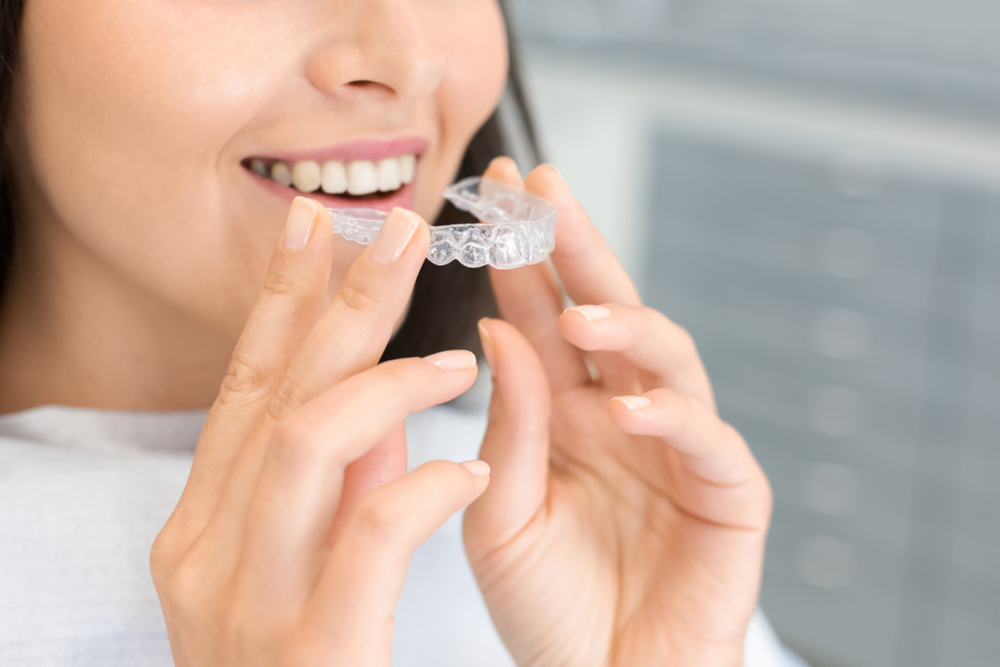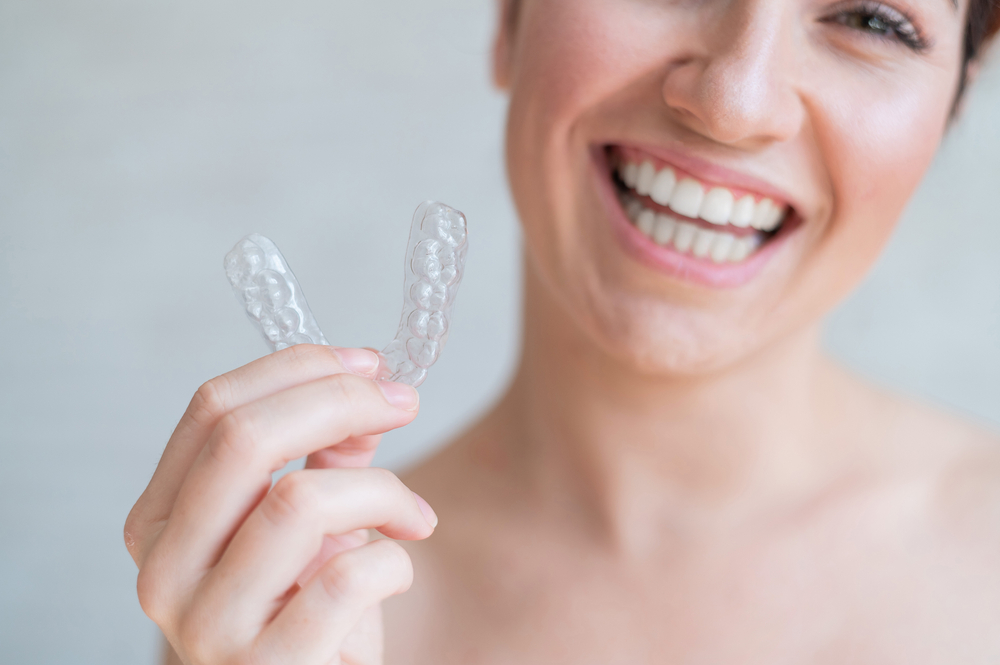
My Orthodontic Retainer Doesn’t Fit Anymore
You finished your braces or Invisalign® treatment and your orthodontist gave you an orthodontic retainer to wear to maintain your results for life. Then, one day, you go to put your retainer in and it feels extremely tight. What’s going on? Will a too-tight retainer damage your teeth? Should you fight through the retainer pain and keep wearing it until it fits again? Have no fear, our Shorewood and Naperville orthodontists are here to help.
In this post, well cover:
- How retainers work to prevent your teeth from shifting after braces or Invisalign
- Are retainers supposed to be tight?
- Possible reasons why your orthodontic retainer doesn’t fit anymore
- Should you wear your retainer if it doesn’t fit?
- How long are dental retainers supposed to last?
How Retainers Work to Prevent Teeth Shifting After Braces or Invisalign
When you have braces or Invisalign, you’re in what’s known as the active phase of your orthodontic treatment. Your appliance exerts gentle, steady pressure that stimulates a natural biological response known as bone remodeling. This is when the teeth-supporting bone and tissues break down, allowing the teeth to move where the braces wires or aligners are directing them.
When you finish treatment, it takes time for the bone and tissue to rebuild and the periodontal ligaments to tighten back up in order to secure your teeth in their new positions. That’s why you’ll enter the retention phase of your treatment (aka wearing a retainer) immediately after the active phase.
How do retainers work? The appliance holds everything in place while the rebuilding and tightening occurs. At Innovative Orthodontic Centers, we have an established retention protocol where we have patients wear their retainers full-time during this beginning period to lock their bite into place, followed by nighttime wear for life.
Why is lifetime retainer use necessary? As you age, even with the bite locked in position, the teeth experience natural drifting and your jaw can grow a tiny bit more. If you don’t wear your orthodontic retainer and it’s not consistently bringing the teeth back into alignment, you’ll experience unwanted changes, including crowding, a deepening of your bite or a recurrence of gaps between the teeth. The only way to prevent teeth shifting after braces or Invisalign is to wear your retainer as directed.
Are Retainers Supposed to be Tight?
Yes, retainers are supposed to be tight when you first start wearing them. So, you might experience some tenderness and sensitivity, similar to what you felt during your first week with braces.
How long does orthodontic retainer pain last? Well, you shouldn’t feel any serious pain, but the mild discomfort will last for a week or two while your teeth set into place. Your retainer will gradually loosen and become more comfortable as you wear it. After a while, you’ll barely notice you have it in.
That said, retainers are not supposed to be so tight that they’re uncomfortable after you’ve been wearing them for some time. If this happens, say months down the road, it’s an indication that your teeth are shifting or something is wrong with your retainer.
Why Your Orthodontic Retainer Doesn’t Fit Anymore
There are a few possible reasons why your retainer doesn’t fit anymore, including:
Your Teeth Shifted Because You Forgot to Wear Your Retainer
The most common reason for a tight retainer is forgetting to wear it for an extended period. As we mentioned, teeth shifting after braces or Invisalign is natural and the only way to prevent it is to wear your retainer as prescribed.
Your retainer is custom designed for a perfect fit based on the positions your teeth were in at the end of your treatment. If you don’t wear it diligently, especially during the first few months, the teeth will move and this will affect the fit. In extreme cases, your retainer might not fit at all.
Your Retainer Was Damaged
Damage to the retainer itself is another reason why your retainer might not fit. If the retainer becomes distorted, it will no longer be molded to your teeth.
At Innovative Orthodontic Centers, we provide our patients with Vivera® retainers, sometimes referred to as Invisialign retainers since they’re made by the same company. These clear, plastic retainers can become warped by heat (i.e., drinking hot beverages with your Invisalign retainer in your mouth, washing them with hot water or leaving them in a hot car or out in the sun). They can also be damaged if you chew on them or a pet gets a hold of them thinking they’re a treat.
A Hawley retainer, which is the type of orthodontic retainer that consists of acrylic and wire, can also become damaged. Things like taking it out incorrectly, stepping on it or bending the wire while playing with it will interfere with how it fits.
Your Retainer is Very Old
While we’ll talk about how long retainers are supposed to last shortly, with proper care, you’ll get years of wear out of your appliance. However, retainers aren’t designed to last forever. Eventually, they will lose some of their shape and your retainer won’t fit properly anymore.
Should You Wear Your Orthodontic Retainer if it Doesn’t Fit?
Whether or not you should wear your retainer if it doesn’t fit depends on the situation. If your appliance is tight because you forgot to wear your retainer for a week, but you’re still able to put it in fairly easily, you can wear it without a problem. Use it full-time until it feels comfortable again.
If, on the other hand, you cannot get your retainer in your mouth comfortably or you feel like you need to force it, do not wear it. Forcing in a tight retainer can damage your teeth. This is especially true for Hawley retainers as the wire could harm your enamel if it’s tight to the point of barely being able to get it in your mouth.
If your retainer was damaged somehow, again, you shouldn’t wear it if it takes a lot of effort to get it in your mouth. If an old or broken retainer is loose, wearing it won’t damage the teeth like forcing in a tight retainer can. However, the retainer won’t be able to exert the needed retention force to do its job properly, which could result in your teeth shifting. In these cases, your retainer will need to be adjusted or replaced.
Since we use Vivera clear retainers and digital scanning, we save your scans on our cloud and can quickly create new retainers for you without you having to come in for new scans. You can pick up your new retainer when it’s ready or we can even mail it to you if you’ve moved away.
How Long are Dental Retainers Supposed to Last?
Permanent Retainers
A permanent retainer that consists of a wire that’s bonded to the teeth is often the longest-lasting type of dental retainer. While a permanent retainer is meant to be, well, permanent, sometimes, the bonding material can break down from everyday wear and tear or eating certain hard, crunchy foods.
Plus, a permanent retainer requires extra care since you’ll have to keep it free of plaque and food. Otherwise, they may stay in your mouth for decades. At Innovative Orthodontic Centers, we don’t use permanent retainers or recommend them because the risks outweigh the benefits. They’re not as effective at maintaining the position of all of the teeth in your mouth since they only hold six to 12 teeth. They also increase your risk of tooth decay.
Removable Retainers
Removable retainers, such as clear retainers and Hawley retainers, tend to take more abuse since you’re handling them a lot. These retainers will need to be replaced more often but with excellent care, even these can last for up to 10 years.
Vivera Retainers
At Innovative Orthodontic Centers, the Vivera retainers we use are 40% stronger than any other retainer material on the market today. Thanks to the high quality, your Invisalign retainer will last longer than your typical clear retainer. They never need to be adjusted and since they slip over your teeth, they are able to retain your final alignment to an extraordinary degree.
After taking a digital scan of your teeth, CAD/CAM technology is used to create four sets of identical clear retainers for you. This will give you peace of mind knowing you have a backup for years to come.
The Bottom Line
If your orthodontic retainer doesn’t fit anymore, don’t try to force it in your mouth or put off getting a new one for too long. Wearing your retainer diligently is the only way to prevent your teeth from shifting after braces or Invisalign treatment.
Connect with a Shorewood or Naperville Orthodontist
Whether your retainer doesn’t fit anymore, is tight and uncomfortable or it was damaged, contact Innovative Orthodontic Centers in Shorewood or Naperville. We can create a precise-fitting, durable, clear retainer to keep your smile exactly how you want it.




